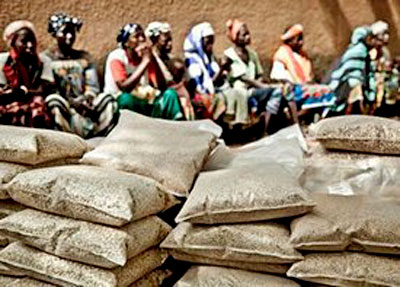|
Goldman Sachs, Morgan Stanley
among those accused of reaping financial harvest from
growing food crisis |
Reports over the weekend saw some of the
world's most powerful financial institutions accused of profiteering
on the backs of the world's poorest people and those most vulnerable
to the wild price fluctuations caused by over-rampant
speculation on
the price of food commodities like,

Nearly a
billion people are already too poor to feed themselves, so any
long-term food spike is guaranteed to trap millions more who are now
just “getting by,” says Oxfam.
"Barclays is the UK bank with the
greatest involvement in food commodity trading and is one of the
three biggest global players, along with the US banking giants
Goldman Sachs and Morgan Stanley,"
reported the UK's Independent, citing research from
the World Development Movement.
Christine Haigh, policy and campaigns
officer at
the WDM and one of the analysts behind the research, said
the behavior of the banks,
"risks fuelling a speculative bubble and
contributing to hunger and poverty for millions of the world's
poorest people."
As droughts have devastated grain crops
in major agricultural strongholds like the US and India this year,
experts warn of a food crisis taking shape across the globe.
The
accusations of 'profiteering' by groups like WDM and
Oxfam
International, however, transcend the price changes due to external
conditions like drought or farmers who use commodity indexes to
protect the price of their crops, and speak to the greed and
recklessness of investors who create volatile trading conditions by
speculating on the future prices of such commodities with no regard
for the harm it does to real people.
"Fragile populations around the world,
living on or near the poverty line, will be dragged under by price
spikes and volatility," said Oxfam in a recent statement.
"Nearly a
billion people are already too poor to feed themselves, so any
long-term food spike is guaranteed to trap millions more who are now
just 'getting by'."
The World Development Movement (WDM) report
estimates that Barclays made as much as $840 million from its "food
speculative activities" over the course of 2010 and 2011.
Barclays
made much more from food speculation in 2010, as the prices of
agricultural commodities were rising, and a smaller sum in 2011 as
prices fell.
As the Independent
reported:
"The extent of just one bank's involvement in
agricultural markets will add to concerns that food speculation
could help push basic prices so high that they trigger a wave of
riots in the world's poorest countries, as staples drift out of
their populations' reach."
Oxfam's private sector adviser, Rob
Nash, said:
"The food market is becoming a playground for investors
rather than a market place for farmers. The trend of big investors
betting on food prices is transforming food into a financial asset
while exacerbating the risk of price spikes that hit the poor
hardest."
And the Independent adds:
The revenues that Barclays and other
banks make from trading in everything from wheat and corn to
coffee and cocoa, are expected to increase this year, with
prices once again on the rise.
Corn prices have risen by 45 per
cent since the start of June, with wheat jumping by 30 per cent.
Barclays makes most of its
"food-speculation" revenues by setting up and managing commodity
funds that invest money from pension funds, insurance companies
and wealthy individuals in a variety of agricultural products in
return for fees and commissions. The bank claims not to invest
its own money in such commodities.
Since deregulation allowed the
creation of such funds in 2000, institutions such as Barclays
have collectively channeled an astonishing $200bn (£126bn) of
investment cash into agricultural commodities, according to the
US Commodity Futures Trading Commission.

